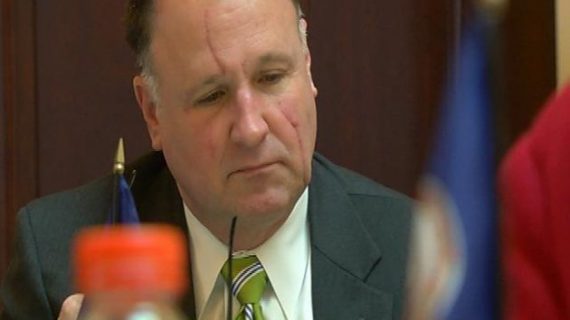Creigh Deeds One Year Later, And The Problems With Mental Health Care In The U.S.
Just over one year ago, Virginia State Senator Creigh Deeds was attacked by his son, revealing problems with our mental health system that have yet to be adequately addressed.
It was just over a year ago that Virginia State Senator Creigh Deeds, who represents Bath County in western Virginia and had been the Democratic nominee for Governor in 2009 in a race he lost to former Governor Bob McDonnell, was stabbed and nearly killed by his son Gus outside the family home. As that story unfolded, it revealed problems in the mental health care system in the Commonwealth, including most prominently the obstacles that Senator Deeds had faced in trying to get his son admitted for observation just one day before the attack that nearly killed him, and which ended with his son’s suicide. Since then, there have been some changes made that make it somewhat easier for family members and therapists to get treatment for someone who is an imminent danger, but much work remains to be done.
In the meantime, Washington Post reporter Stephanie McCrummen is out with a profile of Senator Deeds, the year that he has had, and the work he’s trying to do to fix the mental health care laws so that something like this doesn’t happen again. It defies easy excerpting, so I’ll just recommend reading the whole thing. I can’t imagine what Senator Deeds has been through this past year, but my best thoughts are with him.
The article resurrects, though, many of the issues that came to the forefront in the wake of the attack on the State Senator, and which have also been discussed in the national media, and quickly forgotten, in the wake of tragedies such as the shooting of Congresswoman Gabby Giffords, the Aurora, Colorado movie theater shooting, the tragedy at Sandy Hook Elementary School, and the shootings this past May on the campus of the University of California, Santa Barbara. As with Gus Deeds, in each of those cases there had been signs that the perpetrator of the crime was suffering from some form of mental illness for which, for one reason or another, they didn’t receive treatment. In the case of Jared Lougher, the shooter in the Giffords case, there were signs of problems when he was attending a Community College outside of Tucson, but rather than report anything the authorities handled the matter by barring him from campus. James Holmes, the shooter in the Aurora case, was receiving some treatment from a mental health professional at the University of Colorado, but that ended after he dropped out of college and there was apparently no effort to alter authorities about Holmes even though there had been some evidence adduced during therapy that he could be a danger. Adam Lanza, the Sandy Hook shooter, apparently never received treatment despite signs of trouble in the years before he took his fateful steps. And, finally, the parents of Elliot Rodger had, much like Senator Deeds, attempted to get help for their son in the time prior to the shootings in May but were largely thwarted by laws that make it difficult to involuntarily commit people for more than just a limited period of time absent some stronger evidence that they are a danger, or that they are so delusional that they cannot care for themselves. The common thread through all of these stories, and others that haven’t received national attention, is the fact that our nations mental health system seems to be in serious need of reform, and that failures in that system can all too often lead to tragedy.
As I’ve noted before, there are many reasons for why things are the way they are when it comes to mental health treatment in the United States. To a large degree, for example, the reason that it is often difficult for family members or concerned friends to get help for people who might need it is because of the fact that there is a long history of abuse associated with mental health care. Before the reforms of the 1970s, for example, many of the facilities where these people were “treated” were little more than holding pens in which patients were allowed to exist in filth and barely treated at all for their problems, to the extent we even knew back then how to treat them at all. Mental health also became an excuse in many nations to mistreat political dissidents and people who were pushing culture in ways disapproved of by the state. In the United States, the classification of homosexuality as a mental illness led to many people being treated horribly by so-called professionals. And, of course, there are serious individual liberty concerns associated with the very idea of involuntary commitment and the question of whether or not the state can force someone to undergo treatment, or take medication, against their will. Additionally, there’s the fact that mental illness of any kind, even something that has become as common as clinical depression, carries with it a stigma that can cause serious problems for someone personally and professionally if revealed publicly. We wouldn’t think, for example, of judgment someone diagnosed with cancer as if there’s something wrong with them, but that’s a common reaction to someone who we learn has a mental illness like depression or schizophrenia. That stigma often leads people to remain quiet rather than seek the treatment they need, and family members to ignore signs in front of them instead of getting people help that they need.
The tragedy of the Deeds case, of course, and the Elliot Rodgers case in California, is that in both cases they had parents who tried to get themselves and found themselves thwarted by the law, and by a system that is often in such disarray that physicians and administrators aren’t even aware of what resources they have available. Deeds, for example, had tried to get his son admitted to the local hospital in Bath County, which isn’t a very big facility to begin with given that it is in the middle of one of the most rural parts of the Commonwealth, only to be told that there were no beds were available. Left unstated, because apparently nobody was aware of it, was the fact that there were beds available both in Charlottesville and in Roanoke, each of which are roughly an hour to an hour and a half away, as well as space at facilities in Richmond and Northern Virginia. Thanks to Deeds’s influence with his colleagues, there have been changes to Virginia’s mental health laws, and Elliot Rodgers parents have lobbied in Sacramento to change the laws in California. Those changes have been minimal at best, though, and of course they don’t address problems in other parts of the country. Apparently, those states are willing to wait until there’s a tragedy of their own before dealing with those problems.
In any case, as the profile in the Post makes clear, the consequences of a broken mental health care system can be long lasting. Senator Deeds has chosen to use the tragedy to try to change the law, and he deserves credit for that, but I can’t imagine the pain that he goes through on a regular basis both physically and otherwise. It would be nice if we could use such a tragedy to actually make things better.







So very sorry for Mr Deeds and his family, but even sorrier that the whole country has been suffering with these problems and they have been totally ignored until one of the “DC Elite” was affected. Do they even know there is a whole country outside of their little circles.
@Pat:
I wouldn’t call Deeds part of the “DC Elite” to be fair.
Thanks for your article spotlighting this very important problem, Doug. The mental health care system in the US really is broken in that its tough for family to get help for people in imminent danger of hurting themselves and others.
BUT… and I hate to be that guy, the biggest mental health care problem in the US is that millions of people don’t access to any mental health care at all, because they don’t have health insurance. Expanding access to mental health care to those folks through the ACA is the best way to help them get mental health care-and frankly, you oppose that and don’t have any solution for that problem, other than cheerfully advising people to learn how to fish, rather than taking a fish-not really appropriate advice for people struggling with mental illness.
Very true, but an even bigger reason why people don’t seek treatment for mental illness is that they have no health insurance. Encouraging people to overcome their fear of being stigmatized and to seek treatment is great, but not sufficient for people who have no insurance to pay for it. What’s the solution there?
@stonetools: Several years ago there were some sort of misguided court decisions that resulted in many mental hospitals having to literally put their patients out on the streets. It became much harder to get help for people. There is a big shortage of facilities and personnel. Many of the hospitals and facilities were closed and shuttered. Many of these facilities were very large, well built, and architecturally some of the most magnificent structures anywhere. Some have stonework, trim, windows, and arches that rival any cathedral. Most are still around and could be fixed up, remodeled,updated and reopened at far less cost than building new ones. Most states have cut their mental health care budgets so much.
@Tyrell:
Well what happened there is that liberal reformers, full of idealism, opposed keeping mentally ill people in those “snakepits.” They led the charge in moving away from institutional care. Their vision was one of robust outpatient treatment programs aimed at maintaining the mentally ill in the community.
Conservatives had a different idea. They closed down the institutions and then simply cut mental health budgets. It’s no accident that homelessness started to become a big problem in the Reagan years, when tax cuts and budget cuts became the right wing cure for everything.
Treatment of the mentally ill is a three legged stool. We must have:
1. laws enabling the commitment of the dangerously mentally ill, balanced against a concern for wrongful involuntary confinement.
2. Services for both in-patient and out patient treatment of the mentally ill
3. Subsidies to help the mentally ill pay for their treatment
Doug discusses 1 thoughtfully, but just seems to assume 2 and 3 are going to be magically there. The article mentions this though:
Maybe Doug can do a follow up post. Clearly, fine tuning involuntary commitment laws is only the first step to solving the problem.
@stonetools:
Expanding access to mental health care to those folks through the ACA is the best way to help them get mental health care
You have obviously never needed mental health care if you think insurance is the answer. My platinum care plan paid such a small part of a loved one’s psychiatric care that it was negligible. Can you imagine what kind od care – if any – a Medicaid recipient would have access to?
In a country where more people die of suicide than homicide, our reluctance to acknowledge that there is even a mental healthcare crisis is ludicrous
@stonetools: I agree with all of that. Mental health care is the forgotten, ignored, overlooked, and stigmatized aspect of health care. Not solveable with normal doctor visits, outpatient procedures, or urgent care.
@Anonymous: the benefits are clearly not adequate for those with severe problems, and honestly are barely adequate for relatively minor problems. We need higher minimum coverage for mental health problems.
But a lot of people have relatively minor problems. Patients with anxiety attacks can learn to manage their illness better, often to the point of no attacks with a relatively short course of CBT or MBSR, for instance.
ObamaCare is a step in the right direction (some minimum coverage), and t sets a framework where we can improve things in the future.
@Gustopher:
One of the problems for libertarians and conservatives here is there is no simple free market solution-such as “Pull yourself up by your bootstraps!”, “Try harder” , “Deregulate, and let free markets work,” etc. In fact, most of the conservative commentary about the ” mental health crisis” are really feints, made to distract attention from the real problem of mentally ill people having easy access to guns.
I’m not surprised that Doug stopped commenting on this thread. He would have to re-examine his thinking on issues like ensuring access to health care-the other two legs of the three legged stool. Of course, he would rather not do that.
@Anonymous:
So what’s the answer-do nothing at all?
@Tyrell: In the case of my state, it wasn’t courts, it was a legislature that closed the state mental health facility because the money could be better spent in out-patient/home care. Then the legislature discovered that out-patient care was going to cost more than they had expected and their response was to simply not start the out-patient/home care system.
It would have been nice to blame this one on the courts, though.
@stonetools: it’s not just these problems. Has libertarianism ever solved anything?
It’s a philosophy that says it’s ok for the wealthy to collude against the poor, so long as the government is not involved. It pretends that the unemployed man and the large corporation are negotiating as equals, and so no oversight is required. If your food is tainted, people will stop buying tainted food. Zoning laws are tyranny.
It’s… just… I don’t want to say stupid, because the very basic principle that people should be able to do what they want with minimal interference is good, but it misses how much one person or corporation can affect others, and worries only about the government.
It’s like being afraid of bears while you’re being stalked by a mountain lion.
Adding to the complexity is that a lot of mentally ill people refuse to admit (or can’t admit because of the nature of their abnormality) that they have something wrong with them. In a lot of cases, they can only tell that something was wrong with them AFTER they’ve undergone treatment for a while.
And yet, if we took away the element of consent, we all know how easy it would be to abuse people….purely for their own good, of course.